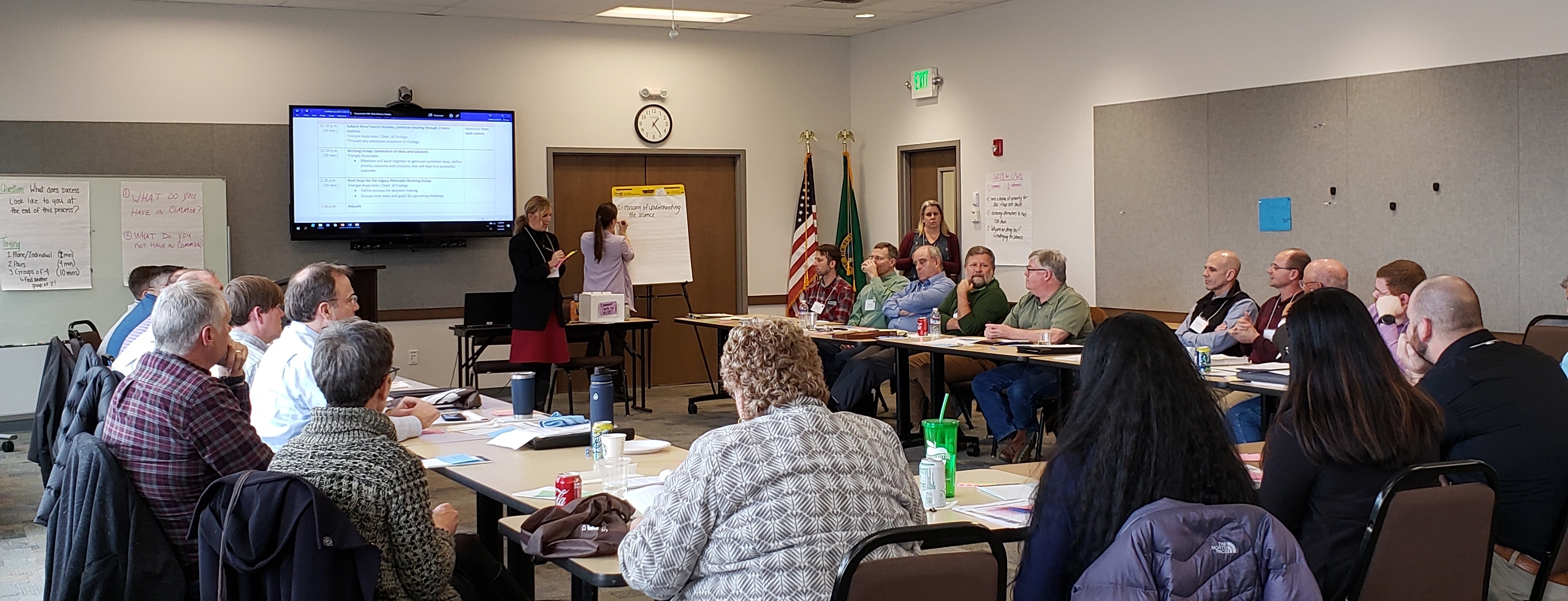
Bloggers note: This blog is one in a series about lead arsenate and its historic use on orchard lands in Central Washington. We are engaging a working group to help us to address this legacy pesticide, especially when those lands transition to new uses like housing developments, schools, and business ventures.
Ecology still at work
The Legacy Pesticide Working Group is continuing efforts to address lead and arsenic contamination on historic orchard lands in Central Washington. In response to restrictions on in-person meetings, we transitioned to a small-group format with virtual meetings for the near future.
There’s a lot of uncertainty right now due to the coronavirus outbreak and for that reason we plan to move the work group effort forward slowly. Our goal is to keep moving the group forward while respecting members' time and other obligations during this challenging time.
Meeting format changes
Over the past two weeks, we organized the 32-member group into four focus areas with 5-10 members each. The smaller groups will tackle specific topics. Once we can meet again in person, we'll bring those discussions to the larger group for decisions on recommendations.
Our four focus groups are:
- Group 1 – Buyer Notification, Soil Sampling, & Mapping
- Group 2A – State environmental review (SEPA) and Local Permits
- Group 2B – Development Process
- Group 3 – Public Outreach & Education
Timing and discussions
Starting in May, the four smaller groups will start virtual meetings and determine their work plans for the next few months. Using some guiding questions to kick off their discussions, our consultants will assist with online facilitation and note keeping.
Focus areas
The buyer notification group will discuss creating a transparent process to increase awareness about potential lead and arsenic contamination on old orchard lands. The goal is to identify a straightforward way to inform buyers about historic orchards, sampling, and mapping without negatively impacting financing or home prices. This group will also strategize the best way to roll out Ecology’s online searchable mapping feature that will allow the public to easily find specific property information.
Initial focus area topics for the SEPA and Local Permits group include providing ideas for creating a local planning and permitting process that includes sampling and cleanup. We want to ensure that this process is transparent and flexible and can be implemented in multiple localities.
The third group, Development Process, will work to outline the existing process that homebuilders and developers navigate to bring projects to completion and identify challenges within the current process. In addition, the group will outline potential costs related to sampling and cleanup and provide input on ways costs could be mitigated (e.g., creation of a clean soil bank).
Public Education and Outreach is a crucial part of this effort. The fourth group will create a coordinated communication plan that brings together the work of the other three groups. The goal is to increase awareness about the location of former orchards by providing accurate mapping tools, identifying populations-at-risk and exposure concerns, and sharing what we are doing to clean up contaminated properties.
Thanking our health partners
We are all aware that public health departments, first responders, and elected leaders are working above and beyond to make the tough decisions to keep communities safe during this challenging time with the COVID-19 pandemic. We respect and appreciate all their efforts and understand that they may not be able to join these discussions at this time. Therefore, the public education and outreach group will focus their discussions on topics that do not involve health-related impacts until those working group members can join with their critical input.
Call to action
- Learn more about protecting yourself and your family on our Dirt Alert webpage.
- Stay up-to-date on Legacy Pesticide Working Group materials, discussions, and background materials by visiting the Legacy Pesticide Working Group webpage.
- Find out more about historic orchard cleanup efforts on our Former Orchard Lands webpage.
- Read our other blog posts on potential contamination on former orchard lands
- Request free soil sampling on your property by contacting us at the numbers below.
Contact information
Jill Scheffer Jeff Newschwander
Section Planner, Toxics Cleanup Program Area-wide Contamination Coordinator
jill.scheffer@ecy.wa.gov Jeff.Newschwander@ecy.wa.gov
509-454-7834 509-454-7842

